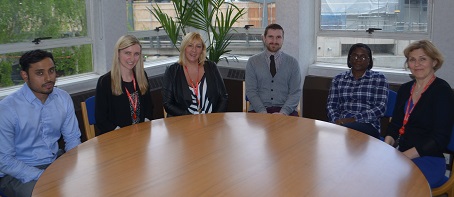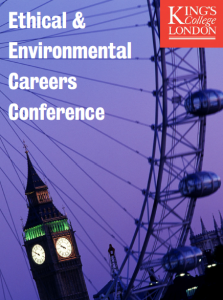With the Environmental and Ethics Career Conference coming up on Monday, I asked members of our team how they got to where they are now and if they had any advice for students and graduates who would like a career within Sustainability. Here’s what they said:
Tom Yearley, Energy Manager
M y name is Tom Yearley, I am currently the Energy Manager at KCL. I took this role in September 2014 to progress my career as an environmentalist. As energy manager I am responsible for paying all utility bills for the University and for the University achieving the 43% carbon reduction target by 2019/20. This is a significant challenge and to date I have established a fund of over £3,000,000 to invest in order to achieve the savings.
y name is Tom Yearley, I am currently the Energy Manager at KCL. I took this role in September 2014 to progress my career as an environmentalist. As energy manager I am responsible for paying all utility bills for the University and for the University achieving the 43% carbon reduction target by 2019/20. This is a significant challenge and to date I have established a fund of over £3,000,000 to invest in order to achieve the savings.
To get to where I am today I did an undergraduate course in economics: the study of scarce resources. Since leaving University I have worked for a wide range of public and private sector organisations, including banks, law firms, food manufacturers, BAA, the BBC, and a gas import terminal. Most recently I spent five years working at the University of Reading as their Energy Officer. My aim through my career has been to gather a broad range of experience across the sustainability sector. Along the way I have become a full member of IEMA and a Chartered Environmentalist.
If you want a job like mine, I would suggest a similar objective. I see one of my key strengths is the breadth of experience I have gained. I would recommend that a year as a junior consultant in a good consultancy company is more useful than an MSc. That’s not to say that an MSc in a subject you wish to specialise in is not important! There are many opportunities for recent graduates to gain employment in the environmental sector, including paid internships, junior consultancy roles and the more traditional graduate recruitment roles.
Martin Farley, Sustainable labs project coordinator
I  started working in biology labs thinking I was going to finish a PhD. The labs I happened to work in highlighted to me that science had other issues beyond trying to get my stem cells to differentiate correctly, and the program I was in afforded me an opportunity to work in another internship.
started working in biology labs thinking I was going to finish a PhD. The labs I happened to work in highlighted to me that science had other issues beyond trying to get my stem cells to differentiate correctly, and the program I was in afforded me an opportunity to work in another internship.
I was tired of studies that weren’t exciting me, so I started to just google words that I liked the sound of. One of the first searches was ‘green science’ and I ended up coming across an article about a fellow in the US named Alan Doyle. A few contacts later, I ended up as a laboratories programme facilitator in the University of Edinburgh. Since then, I’ve loved the progress and growth in this position and can’t imagine going back to research.
If I had to give some advice (which I’m still a bit young for), I would say try everything you can until you can’t take it anymore, and then use that experience to push yourself into what you love. It’s been said but if you don’t love it, you won’t do it well.
Ann Maclachlan, Operations Sustainability Manager
I joined KCL in November 2014 as Operations Sustainability Manager. My role covers a wide range of sustainability issues such as development of our Environmental Management System, Sustainable Procurement, Sustainable Construction, waste and running our Sustainability Champions program.
I did a BSc in Immunology and Microbiology followed by an MSc in Environmental Studies. When I left university I got an analyst consultant role with AEA Technology and have since worked as Environment/Sustainability Manager for a range of organisations including an Airport Operator, Interiors fit-out company working in the education and retail sectors as well as for a renewable energy company.
My advice to anyone interested in a career in Sustainability would be to look out for seminars/workshops etc. to attend – these can be great opportunities to not only learn more but also to make connections that can help you progress in a career. Doing your thesis in conjunction with a business can be a great way to gain experience before you graduate – I did a project for mine in conjunction with Edinburgh and Glasgow Airports which gave me some great experience in industry and 18 months after graduating I joined Glasgow Airport as Environmental Assurance Manager!
Sarah Hayes, Sustainability Projects Assistant
My name is Sarah and I am currently working as a Sustainability Project Assistant as part of King’s Sustainability Team. This role is quite varied – I get to organise events, look after the teams communication networks, work with the energy manager and procurement manager to get involved with things such as DEC assessments, Environmental management systems (EMS) and much more.
To get where I am today I studied and undergraduate in Geography and then a Masters in Environmental monitoring, modelling and management. During university I undertook two internships, one with Air Quality Monitors and one with the Renewable Energy Foundation. At the end of my Masters I started working for King’s and have recently become a graduate member of IEMA.
If you would like a job like mine, I would suggest getting as much work experience as possible (which is what this role is great for). If possible try to gain experience whilst at University; even if this is just volunteering with a society or charity at weekends. My two internships during university helped me to realise where I want to go in my career and also helped boost my CV. This role with King’s, along with other graduate and internship schemes, is a great opportunity to get paid experience in the field and I know that this will help me with future career options.
It can be so hard to get your first job (especially if you have found it hard to get any experience), but keep going! One day you will get a ‘break’ and get offered that first job and then the rest is easy…..right?! J
 Over the next few weeks we are meeting various members of different teams within Estates and Facilities. Each week we’ll be asking the team what they do and how they are linked to sustainability at King’s. For our first week we meet Alison and Debbie from the Service Desk.
Over the next few weeks we are meeting various members of different teams within Estates and Facilities. Each week we’ll be asking the team what they do and how they are linked to sustainability at King’s. For our first week we meet Alison and Debbie from the Service Desk.

 ‘I’ve been working in the energy and environmental sector for 20 years, with this being my third stint in Higher Education along with a variety of corporates and consultancies. Over the years I have worked with varies organisations including UEL and Imperial College, London, as well as Green Bridge and EnTech Energy.
‘I’ve been working in the energy and environmental sector for 20 years, with this being my third stint in Higher Education along with a variety of corporates and consultancies. Over the years I have worked with varies organisations including UEL and Imperial College, London, as well as Green Bridge and EnTech Energy. y name is Tom Yearley, I am currently the Energy Manager at KCL. I took this role in September 2014 to progress my career as an environmentalist. As energy manager I am responsible for paying all utility bills for the University and for the University achieving the 43% carbon reduction target by 2019/20. This is a significant challenge and to date I have established a fund of over £3,000,000 to invest in order to achieve the savings.
y name is Tom Yearley, I am currently the Energy Manager at KCL. I took this role in September 2014 to progress my career as an environmentalist. As energy manager I am responsible for paying all utility bills for the University and for the University achieving the 43% carbon reduction target by 2019/20. This is a significant challenge and to date I have established a fund of over £3,000,000 to invest in order to achieve the savings. started working in biology labs thinking I was going to finish a PhD. The labs I happened to work in highlighted to me that science had other issues beyond trying to get my stem cells to differentiate correctly, and the program I was in afforded me an opportunity to work in another internship.
started working in biology labs thinking I was going to finish a PhD. The labs I happened to work in highlighted to me that science had other issues beyond trying to get my stem cells to differentiate correctly, and the program I was in afforded me an opportunity to work in another internship. As you may know, the EECC is offering students and recent graduates of King’s College London the chance to see and hear about the diverse array of organisation and opportunities in these two areas, and will provide sector-specific and role-specific careers advice that is otherwise difficult to find. The EECC is made possible by alumni donations to King;s Community Fund and is co-organised by EcoSoc, the careers department and King’s Sustainability Team.
As you may know, the EECC is offering students and recent graduates of King’s College London the chance to see and hear about the diverse array of organisation and opportunities in these two areas, and will provide sector-specific and role-specific careers advice that is otherwise difficult to find. The EECC is made possible by alumni donations to King;s Community Fund and is co-organised by EcoSoc, the careers department and King’s Sustainability Team.
